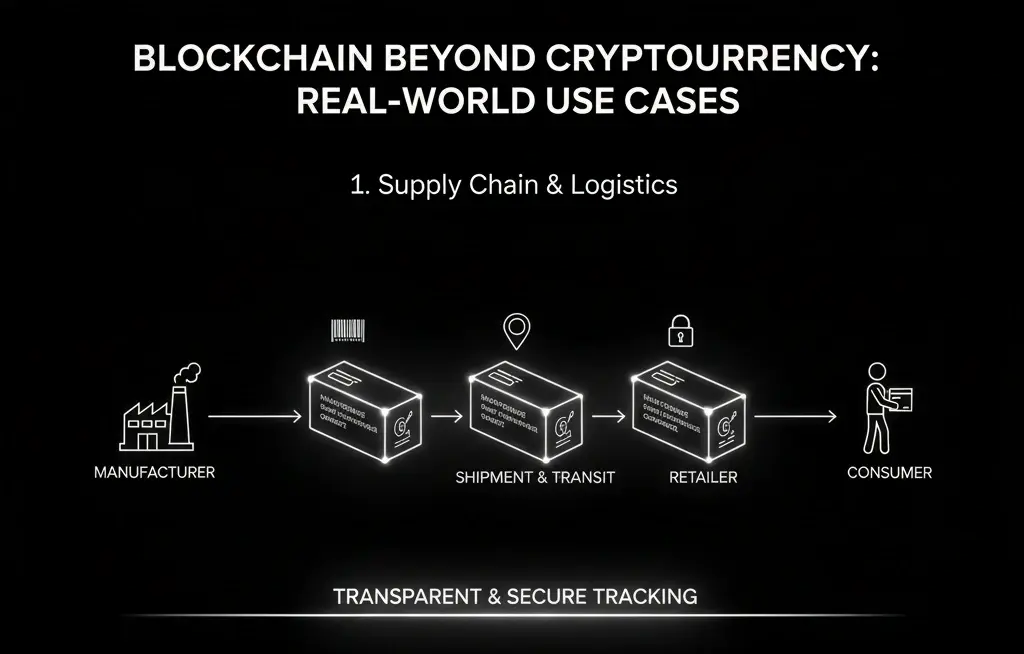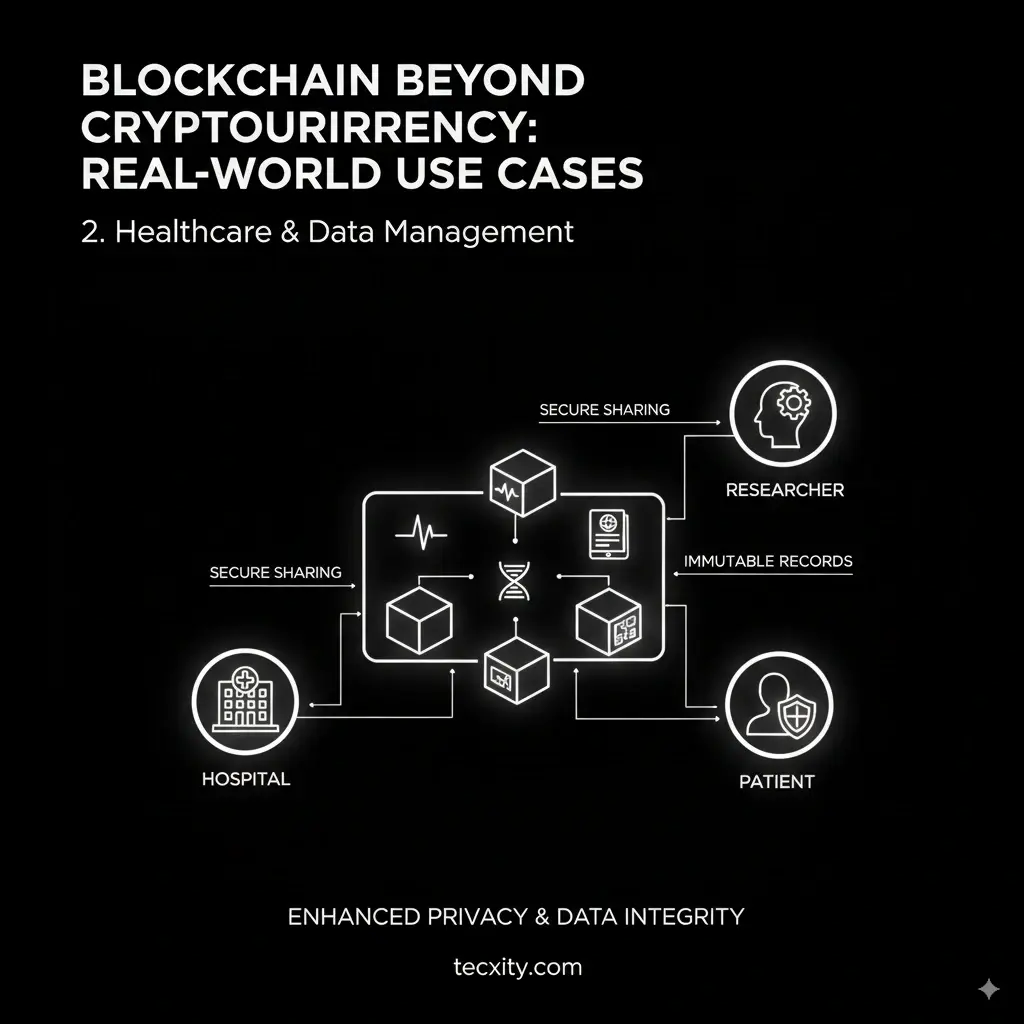Introduction: Beyond Bitcoin
When I first encountered blockchain, like most people, I immediately thought of Bitcoin and cryptocurrencies. But over the years, I’ve realized blockchain is so much more than just digital coins. In 2025, it’s transforming industries like healthcare, supply chain, education, finance, and even climate tech.
I often imagine a world where I can trace my food back to the exact farm it came from, instantly verify a degree for a job application, or vote securely online all thanks to blockchain. And honestly, that future is not as far off as it seems.
In this post, I want to take you on a journey showing how blockchain is reshaping the real world beyond cryptocurrency, through practical examples, data-backed insights, and actionable takeaways for businesses and individuals.
What Is Blockchain
To me, blockchain is like a digital ledger that everyone trusts. Imagine a notebook shared among thousands of people, where every entry is permanent, verified, and impossible to alter without consensus. Unlike traditional databases controlled by a single authority, blockchain runs on a decentralized network, making it transparent, secure, and highly reliable.
Key Features That I Find Exciting:
- Decentralization – No single entity controls it.
- Immutability – Once a record is added, it cannot be changed.
- Transparency – Everyone in the network can verify what’s happening.
- Automation – Smart contracts can execute tasks without intermediaries.
Real-World Blockchain Use Cases I’ve Seen Firsthand
1. Supply Chain & Logistics
I’ve always been curious about the origin of the food I eat. Blockchain has made this fascinatingly simple.
- Example: Walmart, using IBM Food Trust, tracks lettuce from farm to shelf, reducing contamination tracking time from 7 days to just 2.2 seconds.
- Outcome: Faster recalls, fewer frauds, and enhanced trust in the supply chain.
I’ve personally started checking products with blockchain tracking, and it gives me peace of mind that I know exactly where my food comes from.

2. Healthcare & Pharmaceuticals
The issue of counterfeit medicines has always worried me. Blockchain is solving this critical problem.
- Example: Pfizer uses blockchain to monitor vaccine distribution and prevent counterfeit doses.
- Hospitals implement blockchain – based Electronic Health Records (EHRs), allowing patients to control who accesses their medical data.
Benefit: Patients like us enjoy safer treatments, privacy, and trust in the healthcare system.

3. Finance & Banking (Beyond Crypto)
I used to think blockchain in finance just meant crypto trading. But its potential is way broader.
- Example: JPMorgan’s JPM Coin allows instant global payments for corporate clients.
- Smart contracts automate settlements without intermediaries.
From my observation, this reduces transaction costs and speeds up processes dramatically. It’s a financial world without unnecessary friction.
4. Real Estate & Property Management
Buying property can be overwhelming with paperwork and fraud risks. Blockchain simplifies this.
- Example: Sweden is testing blockchain-based property registries to prevent title fraud.
- Smart contracts can automatically execute agreements once all conditions are met.
For anyone involved in real estate, this means faster transactions and greater trust.
5. Voting & Governance
This one excites me the most. I’ve always wondered how elections could be safer from tampering.
- Example: Estonia uses blockchain for digital governance, offering e-residency and secure voting.
- Votes are encrypted and immutable, creating transparency for citizens.
From my perspective, blockchain has the power to rebuild trust in democracy worldwide.
6. Education & Credential Verification
I once lost an old degree certificate, and it was a nightmare to replace. Blockchain solves this issue elegantly.
- Example: MIT issues blockchain-based diplomas that are instantly verifiable.
- Universities are adopting blockchain for transcripts and professional certifications.
Benefit: Prevents fake certificates, simplifies hiring, and saves time for everyone.
7. Climate & Sustainability
I’m passionate about climate action, and blockchain is surprisingly helpful here.
- Companies can trade verified carbon credits on blockchain platforms.
- Households with solar panels can sell excess energy directly to neighbors using blockchain.
- Example: Power Ledger in Australia enables peer-to-peer clean energy trading.
This makes sustainable energy solutions more accessible and transparent.
8. Identity & Security
Passwords can be frustrating, and online security is always a concern. Blockchain IDs can help.
- Example: Microsoft ION provides a blockchain-based digital ID system.
- Secure authentication reduces identity theft risks.
Personally, I feel safer knowing that my digital identity could be stored securely and verifiably.
Why Blockchain Matters For Us
After exploring these use cases, it’s clear why blockchain matters beyond crypto:
- Trust in Data: No central authority can manipulate records.
- Efficiency: Reduces intermediaries and automates tasks.
- Security: Hack-resistant compared to centralized databases.
- Global Adoption: Governments, enterprises, and startups are scaling blockchain fast.
Challenges I’ve Noticed
Even though blockchain is promising, it’s not without challenges:
- Scalability: Some blockchains slow down under heavy usage.
- Energy Consumption: Proof-of-Work systems consume a lot of power, though greener Proof-of-Stake models are emerging.
- Regulatory Hurdles: Governments are still figuring out frameworks.
- Complexity: It’s not always easy for everyday users like us.
I believe understanding these limitations is key to using blockchain responsibly.
The Future I See: 2025 and Beyond
By 2030, I envision blockchain becoming as commonplace as the internet:
- Mainstream adoption in supply chains, banking, and healthcare.
- AI integration where smart agents verify and execute tasks on our behalf.
- Green blockchain solutions tackling sustainability concerns.
- Governments worldwide implementing blockchain for secure governance.
In my opinion, it won’t just be a tech trend it will be a foundation for trust in the digital world.
FAQs (From My Conversations with Peers)
Q1: Is blockchain only for cryptocurrency?
Not at all! It started with crypto, but now it’s being used in logistics, finance, healthcare, and education.
Q2: Which industries benefit most?
Logistics, banking, real estate, healthcare, education, and energy lead the way.
Q3: What major problem does blockchain solve?
Trust. Blockchain makes data transparent, verifiable, and tamper-proof.
Q4: Is blockchain energy-intensive?
Older systems like Bitcoin are, but modern Proof-of-Stake models are much more energy-efficient.
Q5: Can small businesses adopt blockchain?
Yes! Many SaaS platforms make blockchain accessible for small businesses to track supply chains or manage digital IDs.
Q6: How can I get started with blockchain today?
I recommend experimenting with platforms like IBM Food Trust, Power Ledger, or Microsoft ION depending on your interest area.
Conclusion: A World Powered by Blockchain
From my perspective, blockchain has truly outgrown its cryptocurrency roots. It’s reshaping industries and redefining trust in the digital era. From safer medicines to greener energy, from secure elections to verifiable diplomas I’ve seen its impact everywhere.
For businesses and individuals, the key is to understand these real-world applications today. Because tomorrow, blockchain won’t just be a buzzword it will be the backbone of our digital lives.
